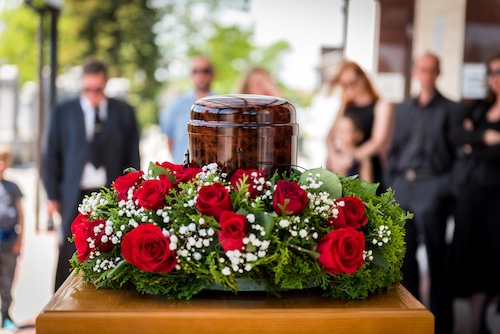
Funerals with a Funeral Celebrant: When a loved one dies their funeral is your time to honour their life and to say goodbye. It is important that you can do this in a way that fits who they were and feels right.
For some, the approach to this may be from a specific faith or religion. For others, a celebrant-led funeral offers a different way of personalising the event.
With a ceremony led by a funeral celebrant, everything can be centred around the perspective of the deceased. It also means that you can include your own or your loved one’s beliefs into the funeral.
Celebrant-led funerals are growing in popularity because they really do offer a chance to tailor the occasion to an individual. However, it may be the case that you have never attended one and would like to know more about them. That’s why we’ve put together this guide, in the hope that it will help you make important choices on behalf of your loved one, at what we understand is a very difficult time.
What is a funeral celebrant?
A funeral celebrant oversees and leads a funeral. They will perform the ceremony and ensure that the whole event is organised in the way that you have requested.
Funeral celebrants can be religious or non-religious. This is the beauty of a celebrant-led funeral when compared to a traditional faith-led one: you have the freedom to include as little or as much of a religious element as you like. If your loved one wasn’t particularly religious, but you would like to include a special prayer or hymn, an independent funeral celebrant can accommodate this.
Their job is essentially to work with you (the bereaved) to create a funeral that perfectly captures the character and personality of your loved one.
How can a funeral celebrant help you with a funeral?
A funeral celebrant will help and support you after the death of a loved one. This is likely to be an exhausting and emotional time for you; a funeral celebrant will absorb the worry of organising a funeral ceremony in this time of turmoil.
From the moment you meet your chosen celebrant they will be a point of support and guidance right through to the funeral and beyond. They will meet with you to listen to the wishes of the family and make sure that these are carried out. If you are unsure about some things, they will explain all choices until you find one that feels right. Your funeral celebrant will prepare and deliver the eulogy on behalf of the family if that is helpful to you, and they will keep you in the loop with arrangements for the funeral itself. The funeral celebrant will work together with the funeral director to arrange everything.
What happens when I meet my funeral celebrant?
Once you have chosen your funeral celebrant they will arrange to come and meet you so that they can learn about your loved one and hear your wishes for the funeral. You should feel a connection with your funeral celebrant and be comfortable trusting them to organise this important event.
Your funeral celebrant will listen to the way you describe your loved one and any memories that you feel able to share. They will understand that talking about them is likely to make you emotional and will do everything that they can to put you at your ease. A good funeral celebrant will be aiming to get as deep an understanding as possible about the type of person your loved one was so that they can make the ceremony fit them perfectly.
After meeting with your funeral celebrant, you should feel confident that they genuinely care about crafting the funeral just how your loved one would have wanted it to be.
What happens at a celebrant-led funeral?
The typical features of a funeral will be largely the same, whether you choose a burial ceremony or a cremation ceremony.
Prior to the funeral ceremony
The funeral celebrant will have met with the family to understand their wishes. They will then have written a draft of the ceremony and shown it to the family in plenty of time for any changes to be made. In the days leading up to the funeral, the funeral celebrant will keep in close contact with the family.
Any details such as specific poems, readings or music choices will have been confirmed and the funeral celebrant will have ensured that the staff at the funeral venue are aware of the necessary. All organisational details will have been taken care of by the funeral celebrant.
On the day
Your funeral celebrant will likely arrive early at the venue to make sure that everything is ready. They will run through timings with the staff so that everything goes as smoothly as possible.
Those attending the funeral will be asked to arrive around 10-15 minutes before the start of the ceremony. If the weather allows, they may gather outside and wait for the hearse to arrive. This is a way of showing their respect for the deceased as well as their support for the immediate family.
The ceremony
Often, the funeral director and the funeral celebrant will lead into the venue. The coffin and chief mourners will follow and behind them the rest of the guests. Your chosen music or hymn will be played. The family will sit at the front and everyone else will sit behind them or to the side. Once everyone is seated, the funeral director will bow to the coffin and move to the rear of the venue, followed by the music fading. The funeral celebrant will then begin the ceremony.
The ceremony will have been crafted by the funeral celebrant in a style that takes mourners on a journey through the life of the deceased, into sadness and grief, before rising in celebration of their life. The funeral celebrant will include any memories and descriptions that have been shared by the family and the ceremony will have a feel of reflection and thanks for all that the deceased brought to the lives of the mourners.
Generally, the ceremony will be structured like this:
- An introduction, with details about the venue for the wake and chosen charity for collections
- A eulogy or tribute, possibly with additional readings from guests
- A short period of quiet reflection before the committal (either in silence or accompanied by music)
- Final words to close the ceremony on a note of hope
How long does a funeral ceremony last?
A funeral ceremony will always be tailored to individual requirements so there is no set length as such.
A cremation ceremony averages around 40 minutes; a burial ceremony tends to be a bit longer, but exact timings will be dependent on the wishes of the family and any limitations imposed by the venue..
What makes a good funeral celebrant?
A good funeral celebrant will of course be someone who listens closely to your wishes but they should also be able to use their initiative and experience to craft the perfect ceremony.
They will combine any requests or information from you with all they have learned about your loved one: what they believed in or cared about; what kind of life they led. This will enable them to create a ceremony that is personal and meaningful.
A good funeral celebrant needs to be a good listener, a good writer, and a good speaker. A celebrant with these qualities will make the whole process run smoothly and finish with a suitably crafted ceremony.
What are the benefits of having a celebrant-led funeral?
A celebrant-led funeral can allow for more openness and inclusivity than a traditional one. They are unrestricted by convention so can be moulded to fit the character of the deceased.
Many people feel that celebrant-led funerals offer a way of bringing more focus on light and gratitude into the ceremony than a typical funeral. A funeral will always be a sad occasion, but a good funeral celebrant can script a ceremony that allows mourners to leave feeling slightly lighter than when they arrived.
What can I expect from funeral celebrant’s tribute?
So much in the modern world is built from a template and a funeral is the last place you want to listen to an impersonal speech. A funeral celebrant will create a tribute about your loved one from scratch. It will be put together with lots of thought and inclusions from you and your family. To personalise the whole ceremony even more, you can:
- Show a slideshow of photos from their life
- Read a special poem or even song lyrics
- Light candles or release balloons
- Play their favourite music
- Theme the ceremony, for example with a colour
The possibilities are endless!
What questions should you ask when choosing a funeral celebrant?
Your funeral director may recommend a funeral celebrant to you, or you may choose one yourself. Before you engage your funeral celebrant, it is a good idea to meet in person or simply have a telephone call if that is easier for you. This is a big decision for you and it can be easier to judge if you feel a connection with a funeral celebrant when you speak to them. You will have questions to ask the funeral celebrant to make sure that they can fit your requirements:
- What is your previous experience?
- Talk me through the process of planning and the actual day of the funeral
- Will you help me write/deliver the eulogy?
- What is your fee and are there any extras?
A good funeral celebrant should be able to answer any questions and put you at your ease.
How much does a funeral celebrant cost?
This will vary but currently you can expect a cost of between £190-£250. There may be an increase in this if the celebrant must travel. Like everything else, prices can vary across the UK.
What are the alternatives to a celebrant led funeral?
Nowadays there are several options when choosing a funeral:
- Traditional funeral with a religious ceremony
- ‘Green’ funeral with a biodegradable coffin and a burial in a natural setting or private land
- Humanist funerals are similar to celebrant-led funerals but do not allow any religious or spiritual content
- Direct cremations are an alternative to people who are not able to travel to a funeral or who do not wish to incur the cost of one
Where can I find a funeral celebrant guide so I can make my choice?
After the death of your loved one, you will understandably be exhausted and it will not be a time you want to spend hours trawling the internet. We have compiled a list of funeral celebrants here. You can browse by location and read profiles and contact details at a glance. You may also find the following links useful if you live in the UK. W
hat to do when someone dies in England and Wales or What to do when someone dies in Scotland. or What to do when someone dies in the UK.
How do I become a funeral celebrant?
Helping people through one of the most difficult times in their life is a great honour. Being a funeral celebrant is rewarding and meaningful. This is why many people switch from a variety of other jobs in order to find a career that really matters.
There are many organisations around the world that will offer you the training to become a celebrant, but to become a good funeral celebrant there are certain qualities it is vital to possess:
- Be able to listen to people with thought and sensitivity
- Respect the wishes of others but also to take the lead with ideas if needed
- Possess the ability to write clearly
- Be confident speaking in front of groups of people
If you are interested in becoming a funeral celebrant you can access our training brochure by clicking the image below.





